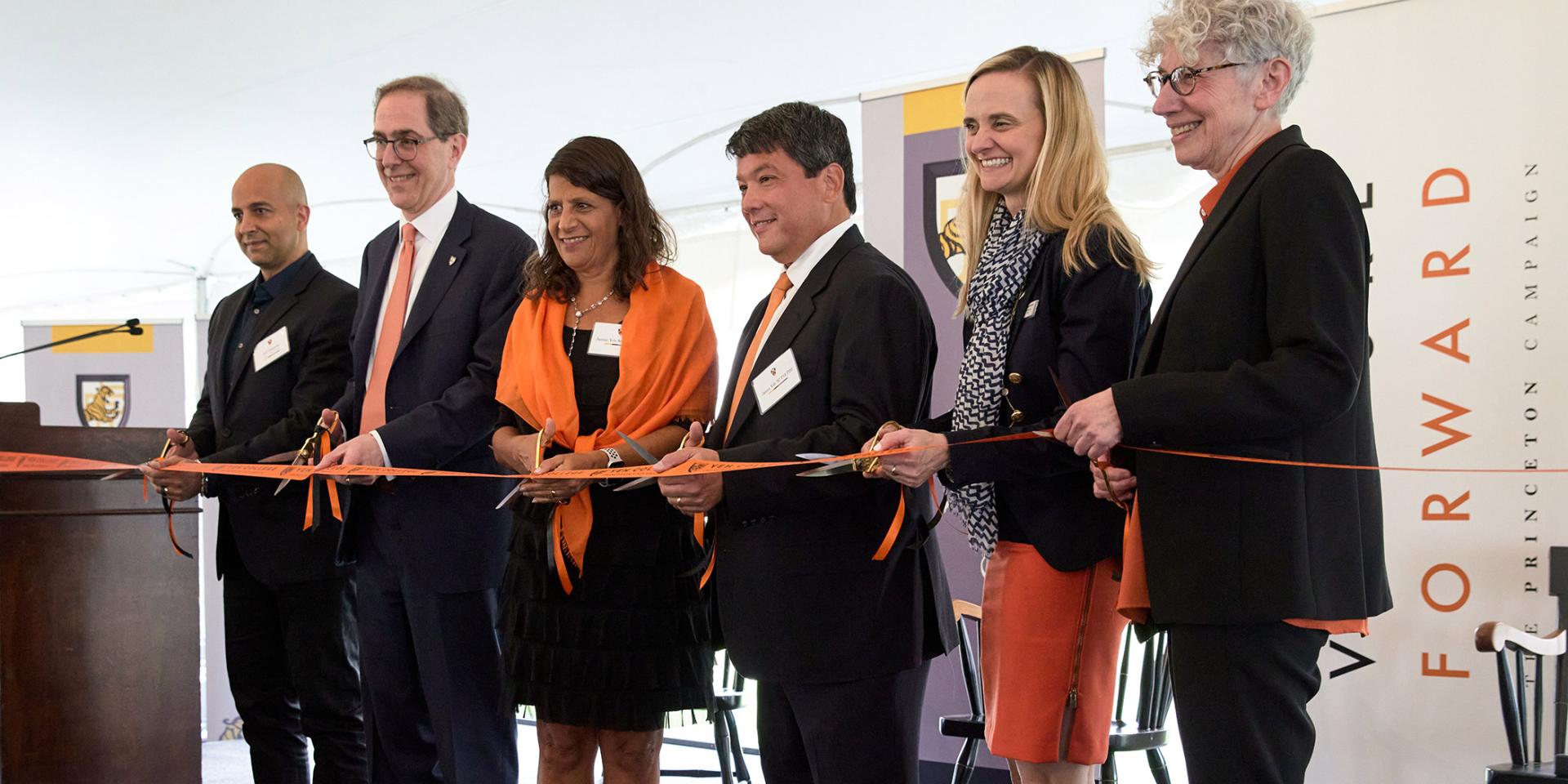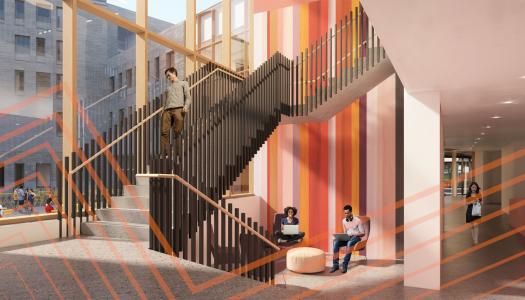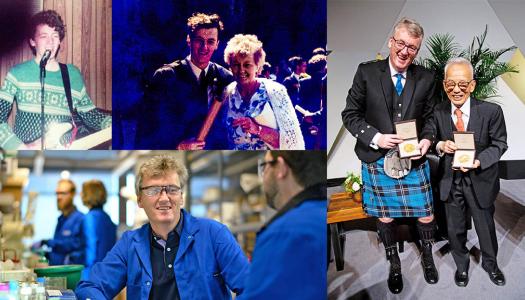Asif Ghazanfar, head of Yeh College; President Christopher L. Eisgruber ’83; Jaimie Yeh; James Yeh ’87; Alexis Andres, dean of Yeh College; Jill Dolan, dean of the college. Photo by Steven Freeman
University celebrates Yeh College and New College West with dedications and ribbon-cuttings
Members of the University community gathered on May 5 to formally celebrate Princeton’s two new residential colleges — Yeh College and New College West — and several named residence halls and community spaces. The new colleges, which opened in the fall of 2022, support one of the highest strategic priorities of the University and of the ongoing Venture Forward campaign: an expansion of the student body so that additional high-achieving students will realize the benefits of a Princeton education, enhance the diversity and vitality of the campus community, and contribute to society after they graduate.
In a series of morning and afternoon building dedications and ribbon-cutting ceremonies, the University acknowledged and honored the members of the Princeton community whose generosity made the new colleges possible and whose names will now become part of the Princeton campus lexicon. Together, the building names reflect Princeton’s emphasis on diversity, access and inclusion.
“Names matter,” said President Christopher L. Eisgruber ’83 during the dedication of José E. Feliciano Hall. “They tell stories. They recall history, celebrate the present and point to the future. The names on our buildings tell us who we are, and who we hope to be.”
Yeh College and New College West house approximately 1,000 undergraduates and two dozen graduate students in eight new residence halls. The increased capacity enabled the University to close First College, which opened its doors in 1961, and begin the construction of Hobson College, which is scheduled to open in 2027. In total, the new colleges will allow Princeton to expand its undergraduate enrollment by 10 percent.
“Expansion is truly a collective effort,” Eisgruber said during the luncheon dedication of Yeh College. “New students grace our campus today because many alumni, parents and friends were inspired by a vision of Princeton’s future and together made this expansion possible.”
The residential colleges have shaped Princeton’s campus life since the current system was instituted in the early 1980s. The close-knit community of colleges are designed as “centers not only for living but for learning,” providing warm, collaborative learning environments that are integral to student intellectual and social development and support an inclusive campus community.
“This is Princeton’s residential college system at its best,” Jill Dolan, dean of the college, said at the dedication of Hariri Hall. “Undergraduates live and learn together in vibrant, immersive environments, with on-site access to faculty and peer leaders. These deeply human and humane resources and many other intricate and effective support structures help our students thrive.”
Under partially cloudy skies and while Princeton students went about their Friday routines in the new residential colleges, the University celebrated the new buildings and spaces in a string of ceremonies. In the morning, friends and guests gathered at Yeh College for separate ribbon-cuttings to dedicate Mannion Hall, Hariri Hall, Choi Glass Box Studio and Choi Dining Hall. At lunch, President Eisgruber and other speakers presided over the dedication and ribbon cutting for Yeh College and New College West. In the afternoon, ceremonies shifted to New College West for dedications of Kanji Hall, Addy Hall, Kwanza Jones Hall and José E. Feliciano Hall.
The dedication for Mannion Hall was the first celebration of the day. Marty Mannion ’81 is the son of Irish immigrants and a first-generation college student who attended Princeton with the help of financial aid. He and his wife, Tristin, made a major gift to name Mannion Hall in Yeh College as a tribute to his mother, Greta, who was a domestic worker for decades so that Marty could have the opportunity of a Princeton education. “I hope this dormitory will remind future generations that even the smallest kindness can create a giant opportunity for someone,” Marty Mannion said. “I only wish my mom had lived long enough to see this. An Irish immigrant and widow, she sacrificed much to give me and my brother everything.”
Guests next gathered at Hariri Hall to celebrate its dedication. The children of working-class parents, Bob and Margaret Hariri are the parents of three Princeton students. They made a gift to name Hariri Hall in Yeh College to help make a Princeton education more accessible to students from all socioeconomic backgrounds. “Maggie and I grew up in New York City at a time when university education and university life was survival of the fittest,” Bob Hariri said. “I can tell you that when I stepped onto the grounds here and saw how these buildings have gone up, and what they really represent for the modern next era of the University, it makes me very proud to be part of it. On behalf of my family, we are incredibly grateful and humbled.”
The celebration then progressed to the state-of-the-art Choi Glass Box Studio within Hariri Hall to dedicate the light-filled music space and Choi Dining Hall, which serves both colleges. “We couldn’t offer a Princeton education to approximately 500 additional undergraduates each academic year without co-investments in high-quality infrastructure, residential and gathering spaces, including Choi Dining Hall,” President Eisgruber said. “The Chois’ generous gift ensures all of the residents of Yeh College and New College West have daily access to nourishing and multicultural cuisine, as well as a beautiful space in which to socialize, study or decompress.”
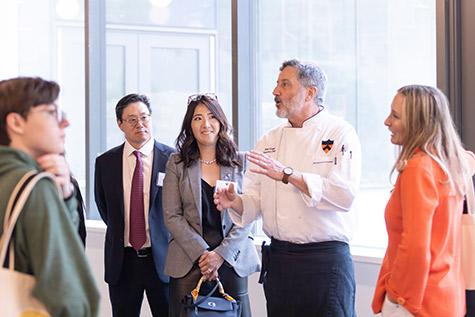
Nathalie Shim Choi ’96 played the violin for the University orchestra as an undergraduate and it was important to her and her husband, Robert Choi, that the new colleges served the University’s vibrant performing arts community. “Princeton has made such a tremendous impact on my life,” Nathalie Choi said. “It’s here that I learned to stretch myself intellectually through my coursework in history, artistically as a violinist in the Princeton University orchestra and personally with the deep friendships I made and still have to this day.”
During the luncheon held in a tent flying orange and black flags on Poe Field, all of the honored guests of the day gathered for the dedication of Yeh College and a ribbon-cutting ceremony for New College West.
“Yeh College is facilitating the growing student body to be sure, but as we all know expansion is about so much more than the simple addition of individuals and spaces to house them,” President Eisgruber said. “Residential colleges don’t merely house students, they create homes in which students can grow, learn and thrive. They build community, they foster connection, provide opportunities for dialogue and collaboration and create a sense of belonging.”
University Architect Ron McCoy *80 shared details from the years of detailed campus planning that occurred long before the University broke ground on the residential colleges. “The Princeton campus is a manifestation of institutional values over time,” he said. “Each generation of the campus builds upon the strengths of its predecessors. The campus is a living record of generational aspirations. In the design of Yeh College and New College West we see how architecture and landscape shape themselves in service of Princeton’s values.”
Maitland Jones ’87, senior principal at TenBerke Architects and the partner in charge of the colleges’ design, literally grew up on the Princeton campus, as his parents were heads of Stevenson Hall. He shared the history of Princeton’s early residential housing and his wish list for how Yeh College and New College West will be embraced. “We hope every student here grows to love these buildings and their years in them and that they become sites of meaningful learning and living and growing together,” he said. “And when Reunions happen here, we hope Princetonians return to campus excited to see these halls again.”
“I think the world of Princeton. It’s a special place because of the relationships you build during those four years on campus.” — Marty Mannion ’81
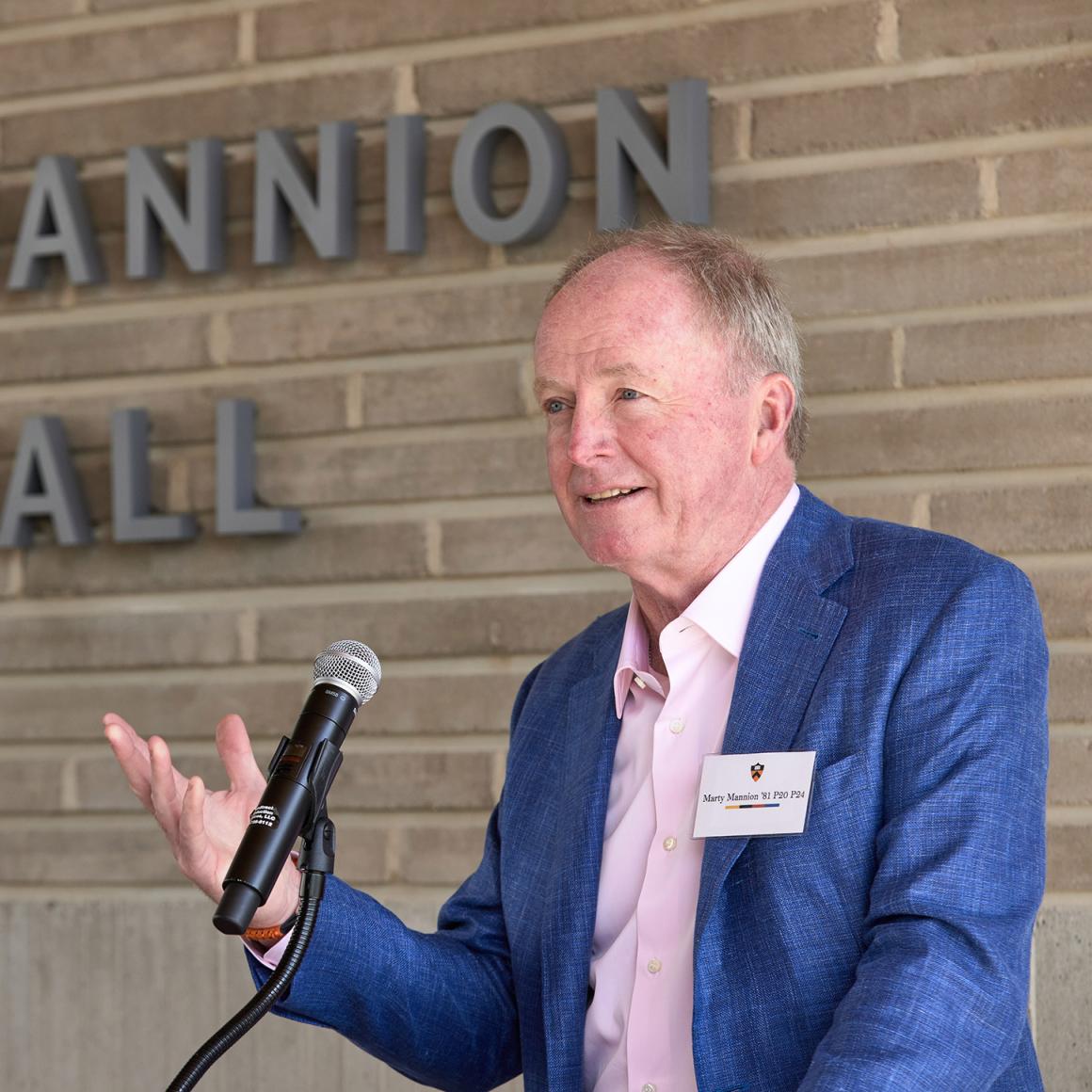
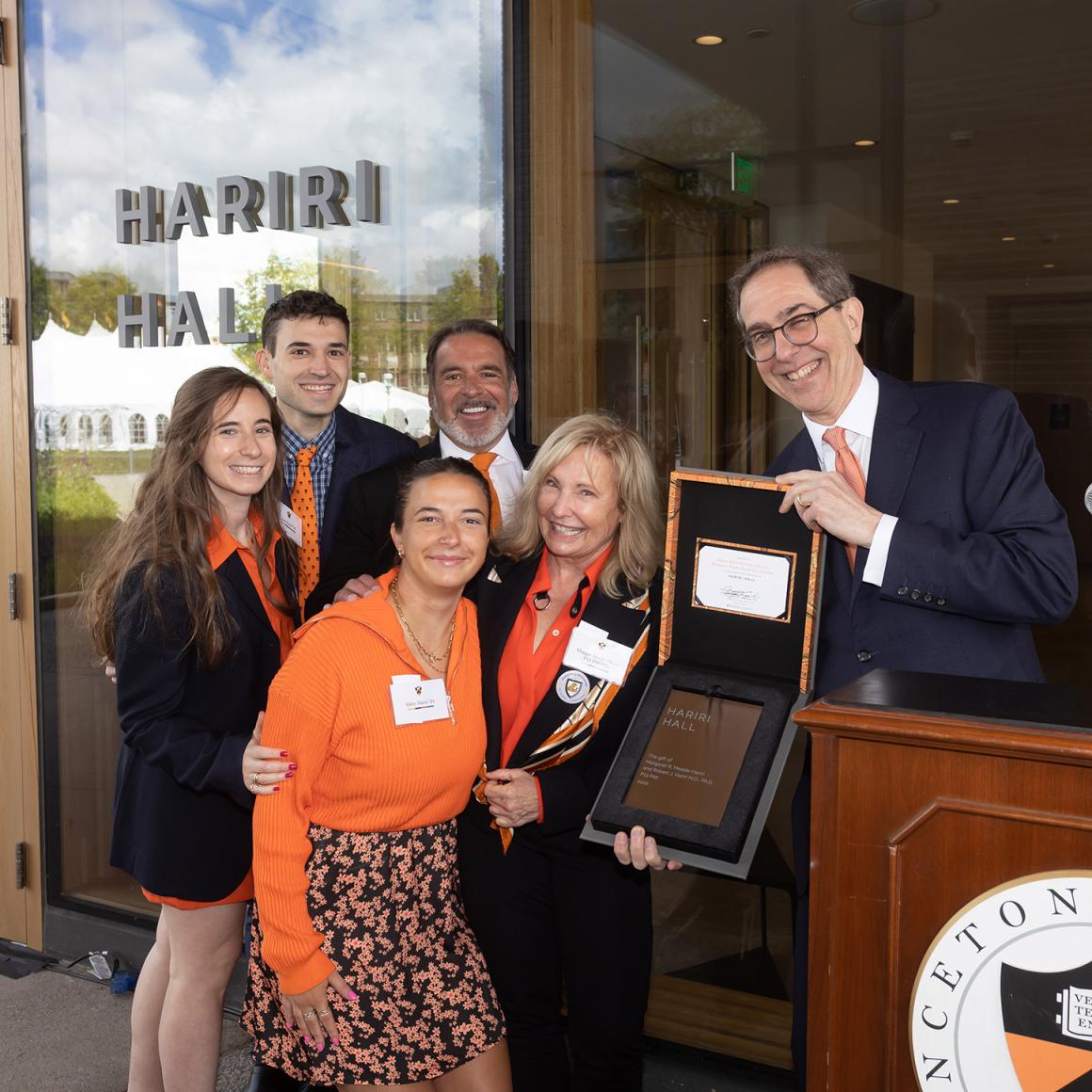
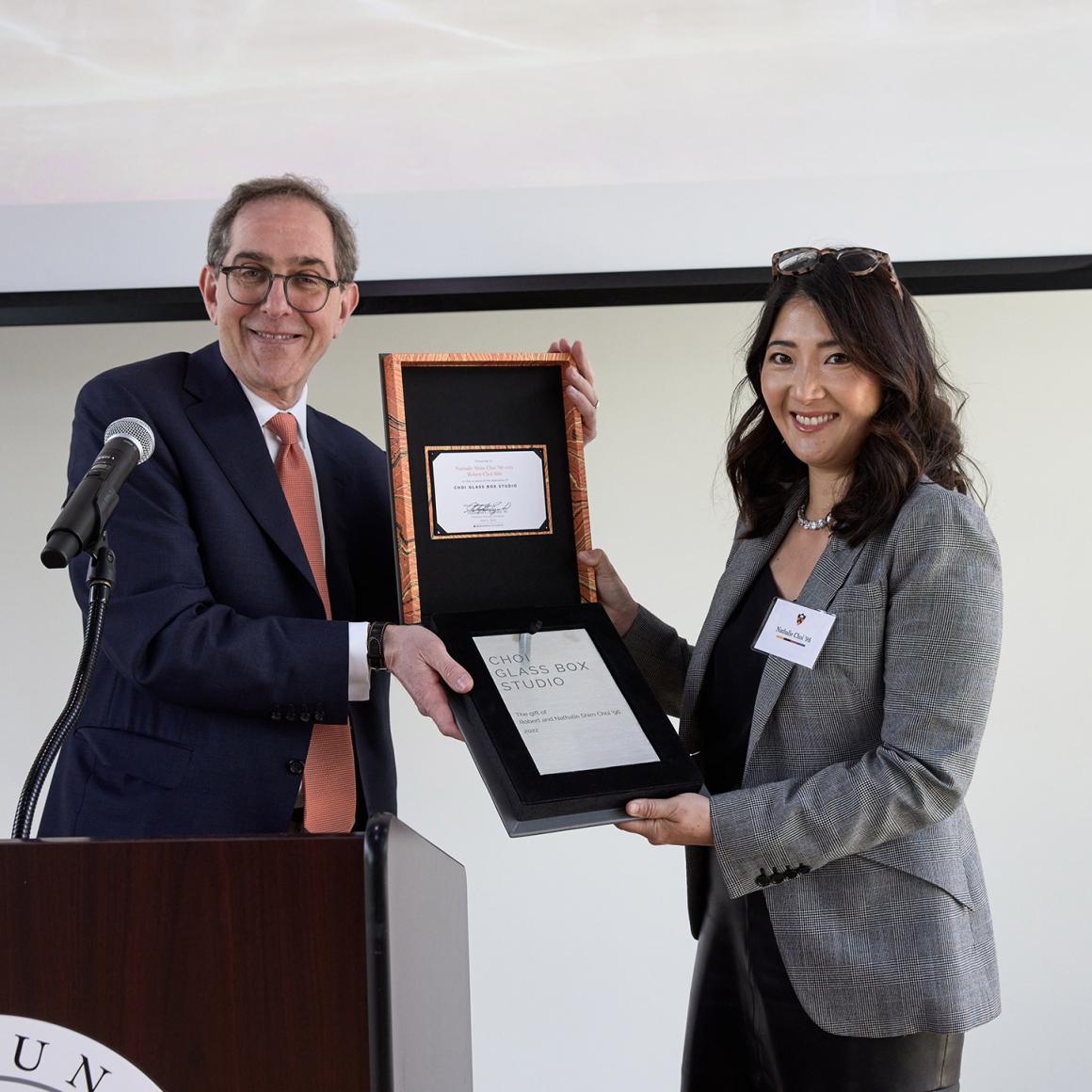
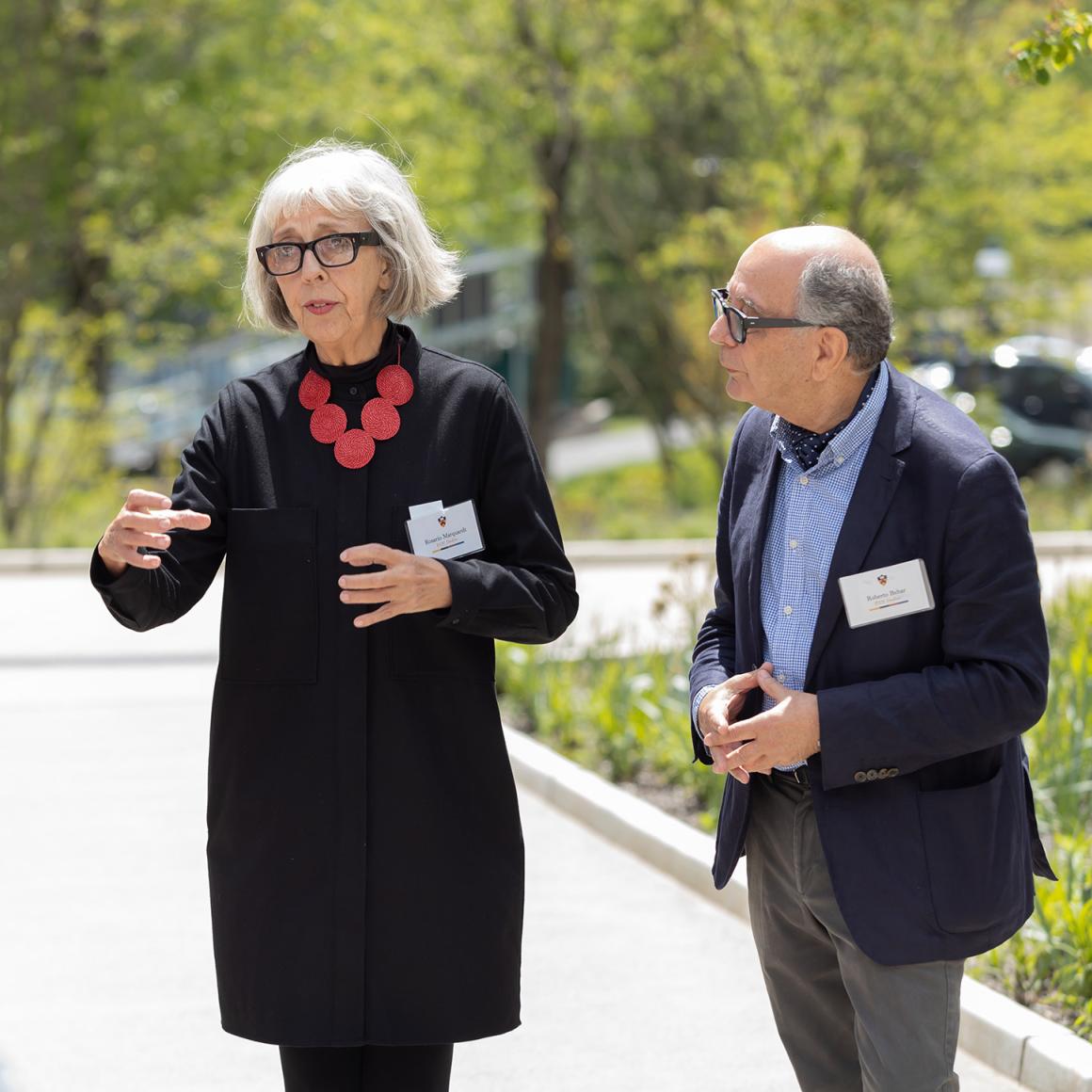
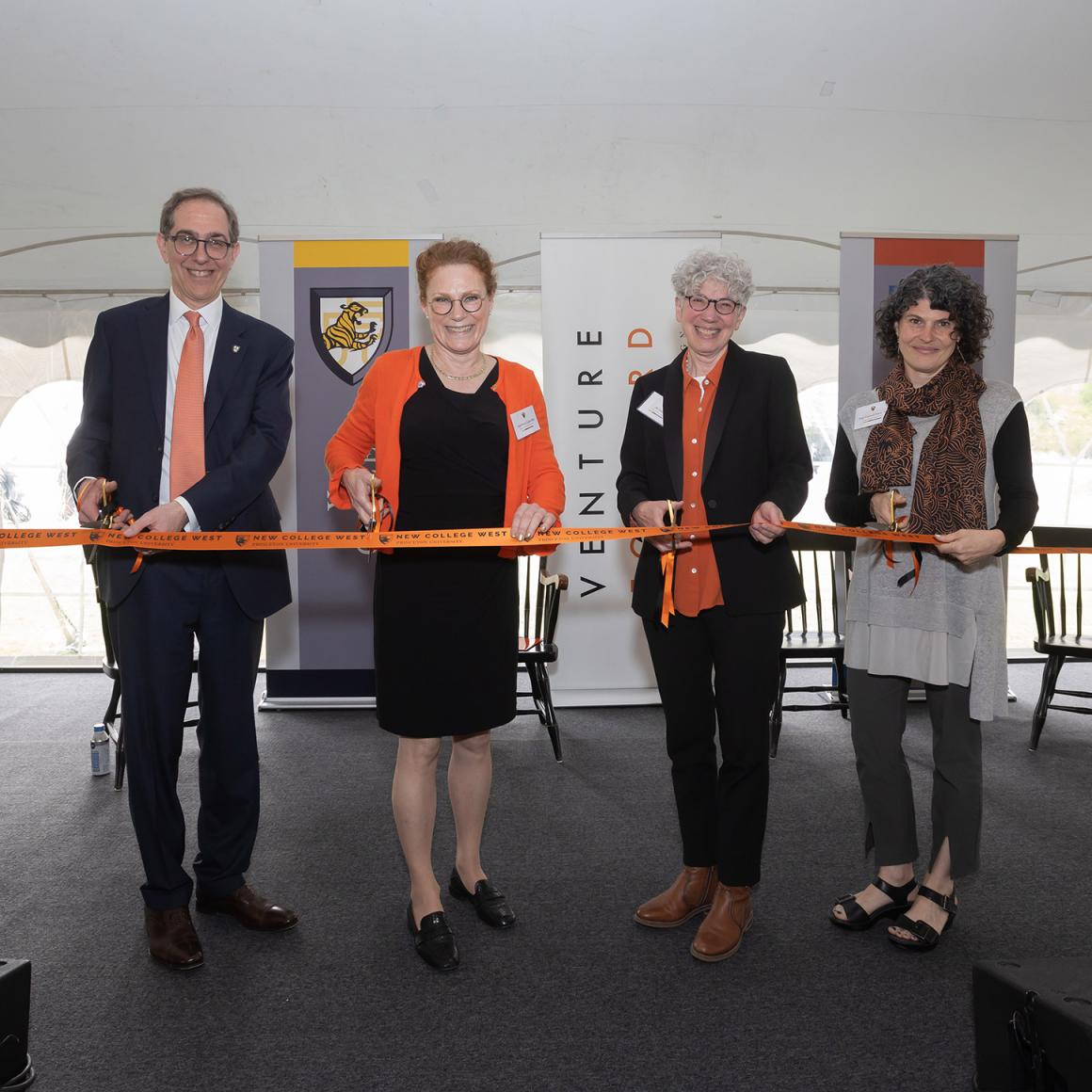
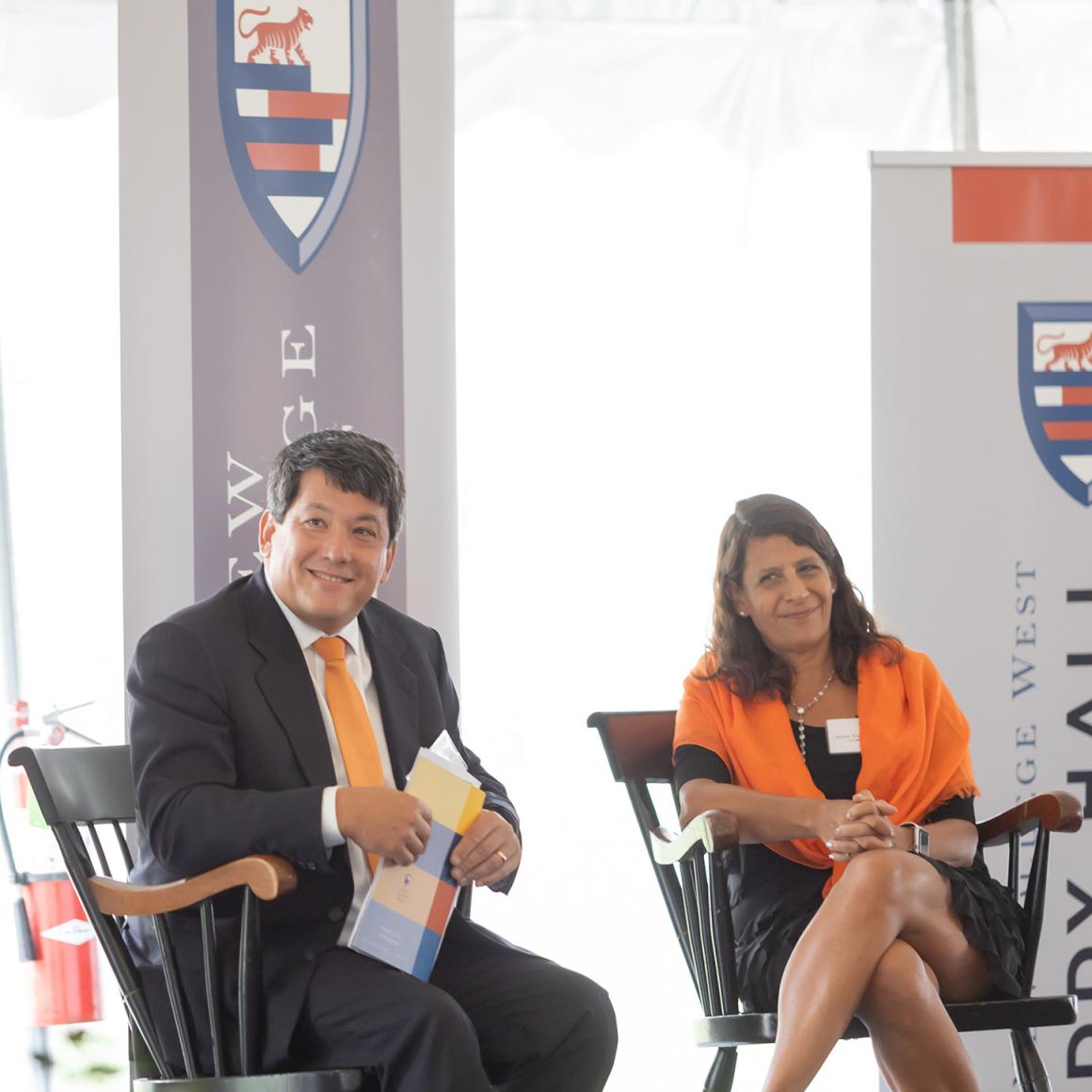
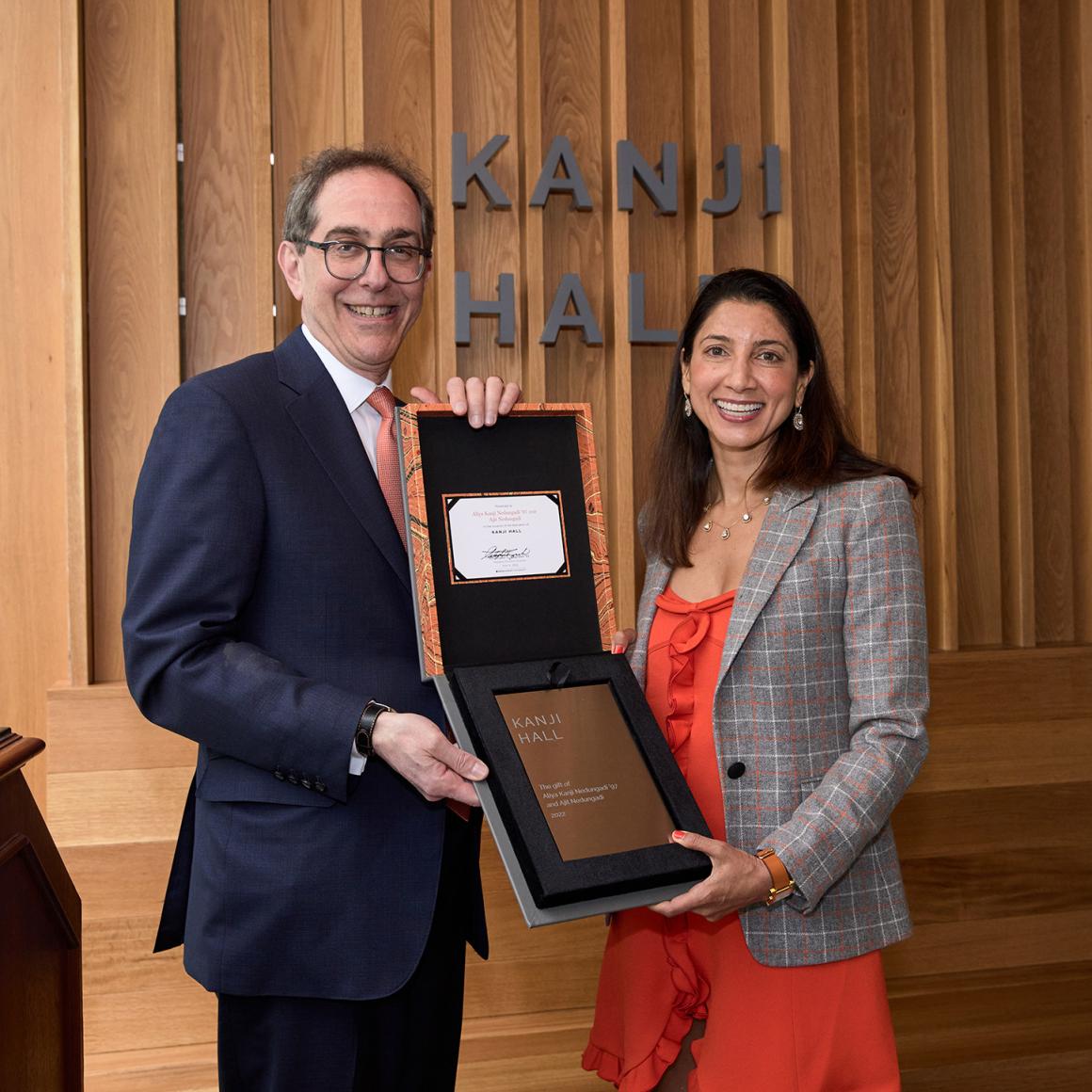
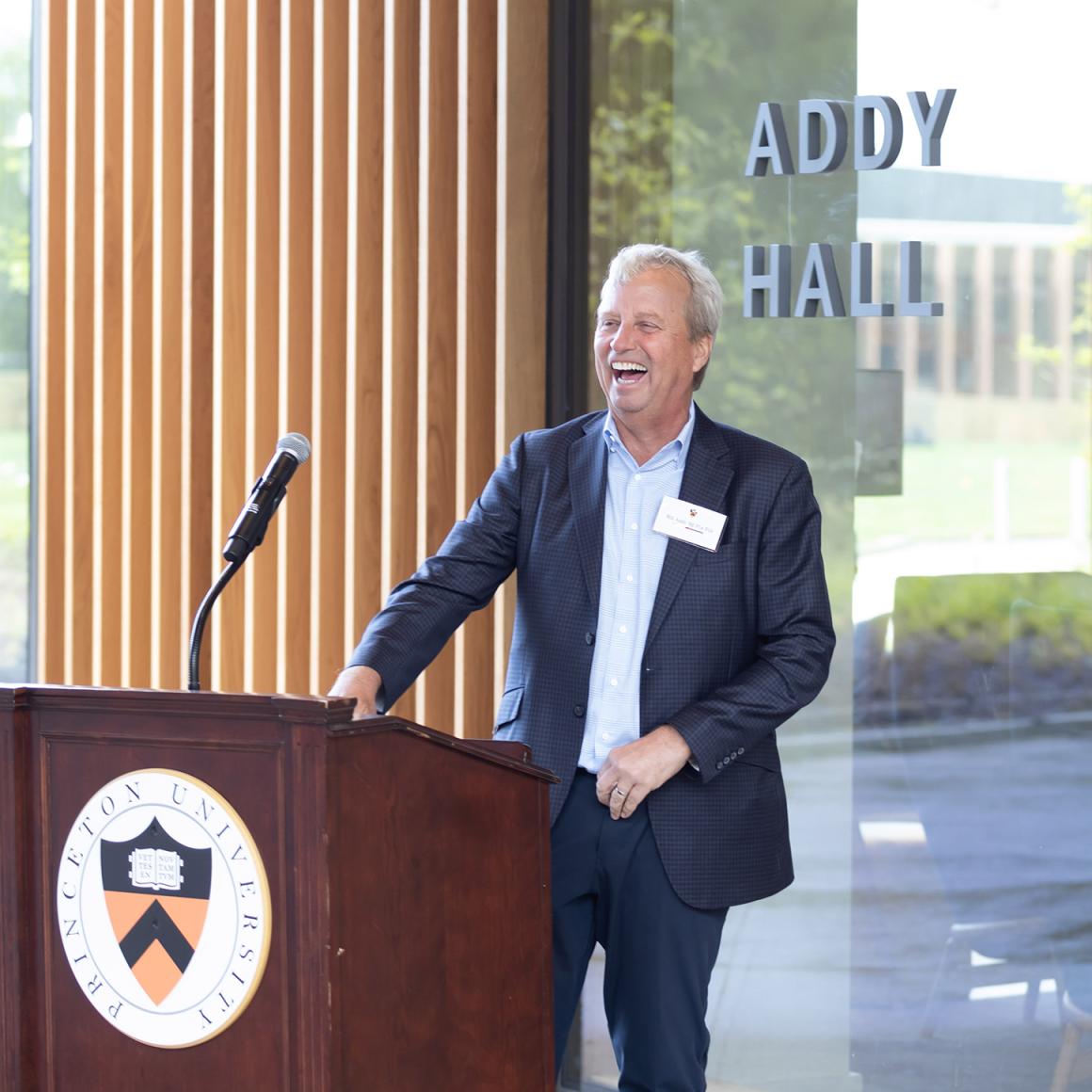
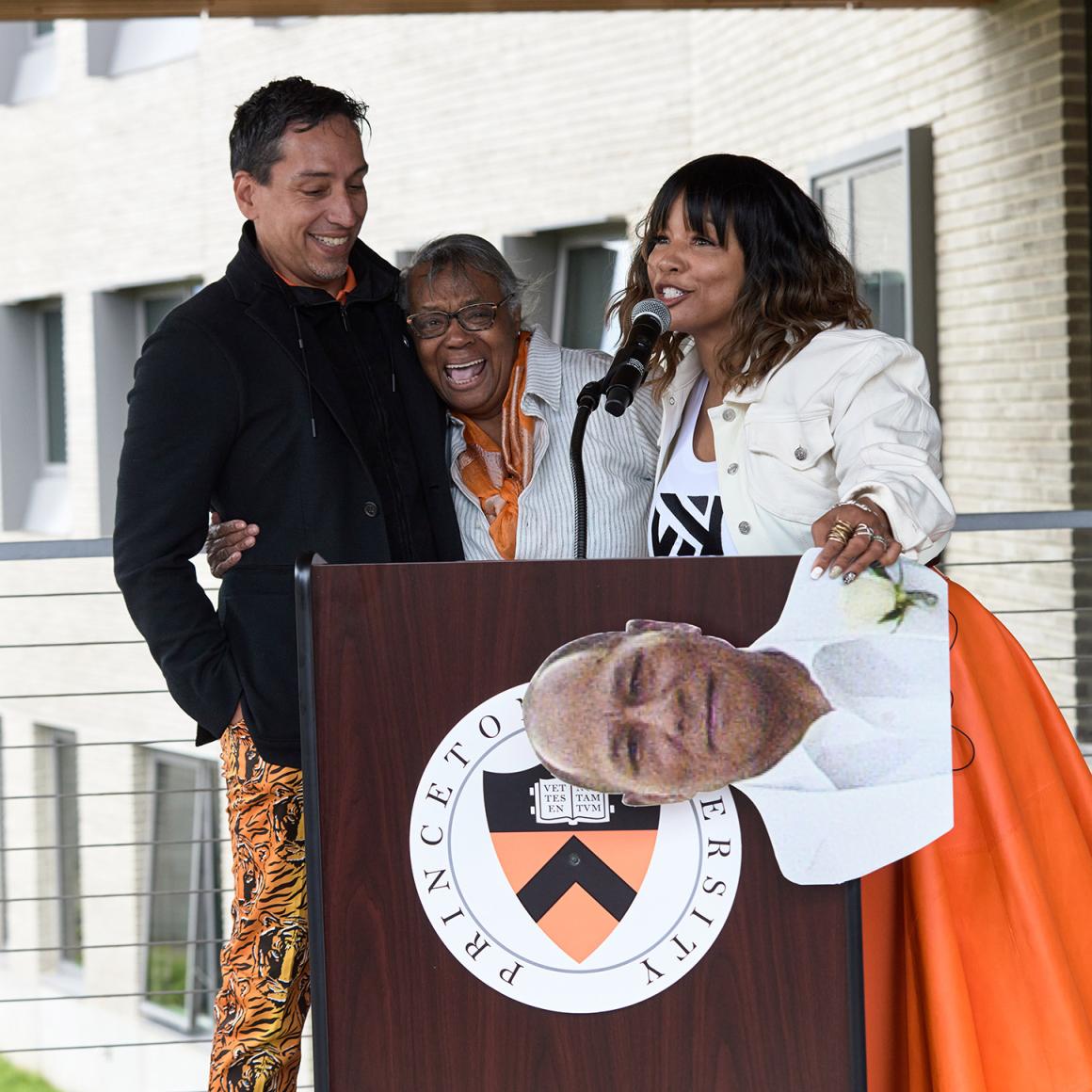
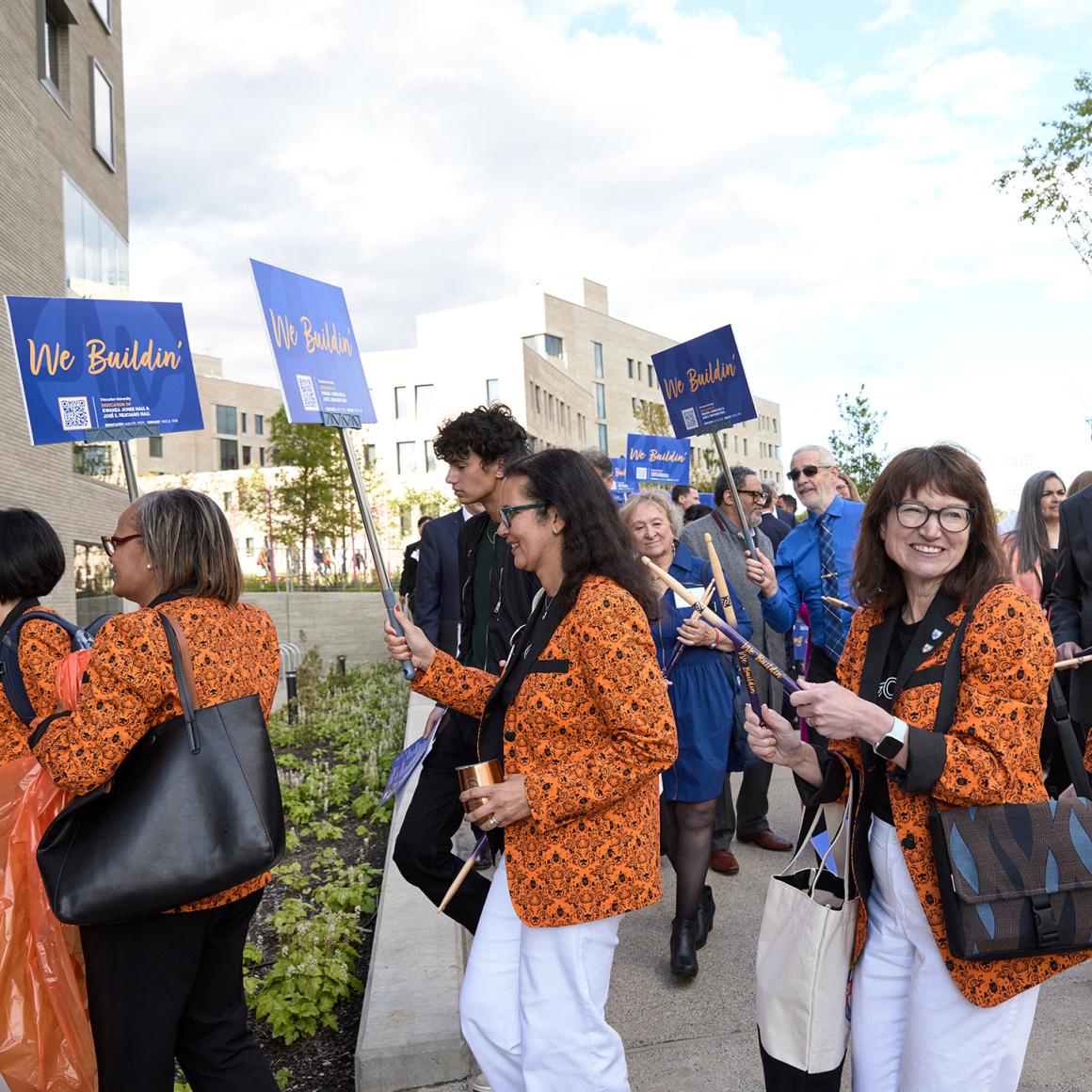
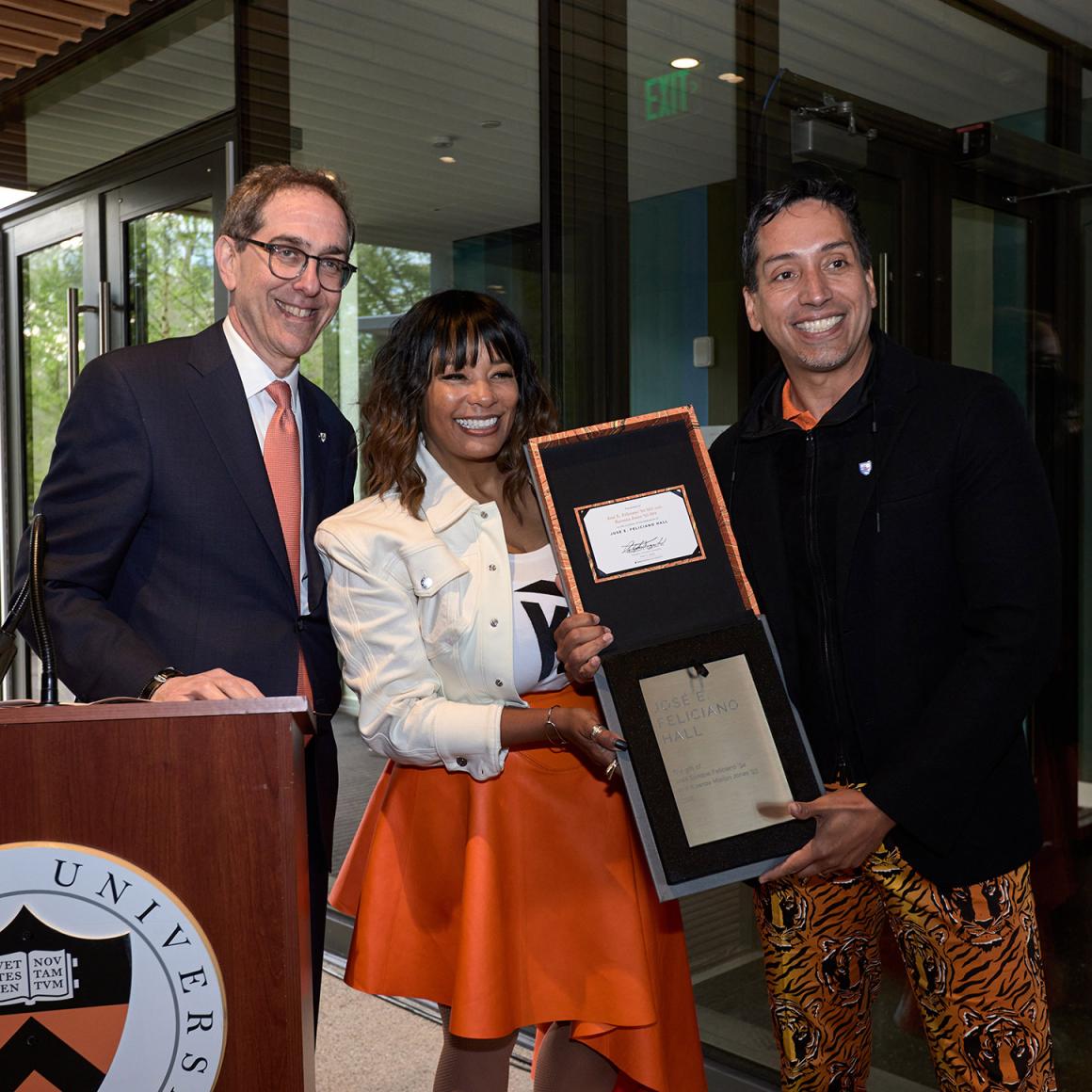
With its dedication, Yeh College officially takes its place alongside names like Rockefeller, Mathey, Butler, Forbes and Whitman. A major gift from James Yeh ’87, a Princeton trustee and co-chair of the Venture Forward campaign, and his wife, Jaimie, helped lead the effort to support undergraduate expansion and strengthen the sense of community that students feel from their residential college the moment they step onto campus.
“Princeton’s residential colleges are physical spaces that serve as a geographical focus, but they’re also something that transcends their physical structures,” James Yeh said in his luncheon remarks. “They are a community within the broader Princeton University community, and in a very real sense, the students and the staff who will live and work there are the college.”
“In less than one academic year, I’ve seen the Princeton spirit in action, as students and staff support each other, forge new traditions and transform brick-and-mortar facilities into a dynamic community,” said Asif Ghazanfar, head of Yeh College and professor of psychology and neuroscience. “Within Choi Dining Hall, you might see students bringing their professors to dinner or sitting at a language table to practice Albanian, Persian or Vietnamese, or to pause briefly to hear a public lecture from one of our faculty fellows. So on behalf of all Yeh students, I offer our deepest thanks to Jaimie and James for making this extraordinary community possible.”
Following the ribbon-cutting for Yeh College, Dean Dolan introduced AnneMarie Luijendijk, head of New College West and the William H. Danforth Professor of Religion, who lives in the Jones+Feliciano House within New College West with her husband, children, and dog, Bobo.
“Our students are truly the spirit of this college,” said Luijendijk. “You can hear it in the melodies flowing from our grand piano in the Commons. You can see it in the art being created — by beginners and pros alike — in our ceramics studio. And you can even smell it in the aromas wafting from our dining hall … and from our demonstration kitchen. We are all so happy to live here, and we’re deeply grateful to all of you for making that possible.”
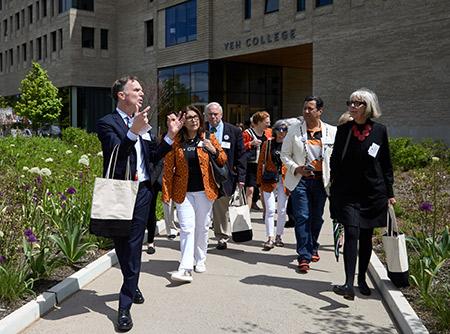
The dedication ceremony for Kanji Hall followed the luncheon and architect-led tours of Yeh College and New College West. Kanji Hall is home to the New College West administration offices and has quickly become a community hub, in part because of its two multimedia-equipped seminar rooms and colorful student lounge. Aliya Kanji Nedungadi ’97 made her gift as a tribute to her extended Kanji family and was inspired by the idea of having the first Ismaili Muslim name on a building at Princeton. “I dedicate this building to honor my grandparents, Dolat and Gulamhusein Pirbhai and Rahemat and Badrudin Kanji; my parents, Zainab Jenny and Amir Kanji; and the Ismaili community at large,” she said.
Guests next gathered outside the bustling student-run coffee shop entrance of Addy Hall to dedicate the dormitory. Lydia and Bill Addy ’82 are devoted supporters of the University — Bill has an unbroken Annual Giving record — and their impressions of Princeton’s built-in support system through the residential colleges were enhanced by their sons’ experiences at Wilson and Rockefeller Colleges. The opportunity to make a gift to name Addy Hall in New College West and extend those opportunities to more students was an easy one, said Bill Addy: “Adding this dorm and giving more students the opportunity to participate in Princeton is absolutely the right thing to do.”
The day of celebrations was capped with dedications of Kwanza Jones Hall and José E. Feliciano Hall. Kwanza Jones ’93 and José E. Feliciano ’94 had their first official date not far from where Kwanza Jones Hall and José E. Feliciano Hall now stand in New College West. The residential halls are adjacent to one another and are the first two Princeton buildings named after Black and Latino benefactors. As several speakers during the two ceremonies noted, they stand as a testament to the aspirations of true inclusion and belonging.
“We’re building bridges, building progress. We’re building companies and connections. We’re building love for this place that means so much to us,” said Kwanza Jones, referencing the lyrics to one of her songs, “We Buildin’.” “One fun fact: There is a bridge that connects Kwanza Jones Hall to José E. Feliciano Hall. So when we’re talking about buildings and connections, it’s not just metaphorical. It’s literal.”
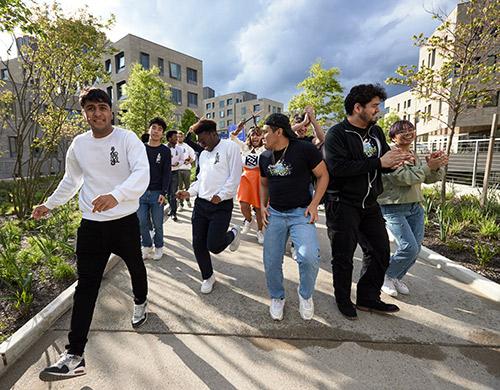
During the ceremony, Jones welcomed several guests to the lectern, including family members such as her mother and her sister, Meta DuEwa Jones ’95, as well as friend Michael Eric Dyson *93, to contribute to the dedication. Kenny Grayson, a beloved Princeton staff member since 1971, sang “His Eye is on the Sparrow,” and when it was time for the celebration to shift to José E. Feliciano Hall, Jones invited Más Flow, a Princeton student dance company, and Old NasSoul, a student singing group, to lead the jubilant procession across the bridge.
In the day’s final dedication, friends spoke about Feliciano’s journey from Puerto Rico to Princeton, and Puerto Rican saxophonist Benny Marin performed a solo. Anthony Romero ’87, executive director of the ACLU, shared the message of one current resident of José E. Feliciano Hall — his godson — who is inspired daily by the Latino name that marks his Princeton home.
“I’m just deeply grateful to have been fortunate in life to be able to make an impact in the lives of others and to continue trying to leave this place a little bit better,” Feliciano said. “I am firmly committed to the belief that things like talent and judgment don’t have a color, don’t have a religion, don’t have a sexual preference. So if we can discover and exploit that potential for our nation, for humanity, for the world, I think we’ll be in a better place.”
During the full day of ceremonies, guests and friends toured the new colleges with the architects, met the artists who designed the brightly colored outdoor social sculptures, witnessed an arts demonstration in the New College West ceramics studio, listened to faculty lectures and mingled with students. At the end of the day, the campus community was invited to a celebratory reception for all attendees, Yeh and New College West students and staff, and the campus community.
